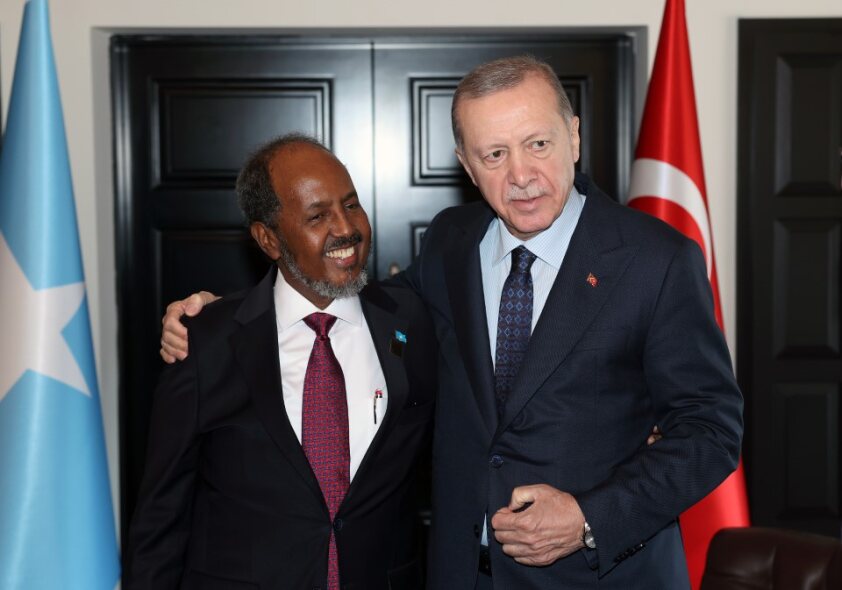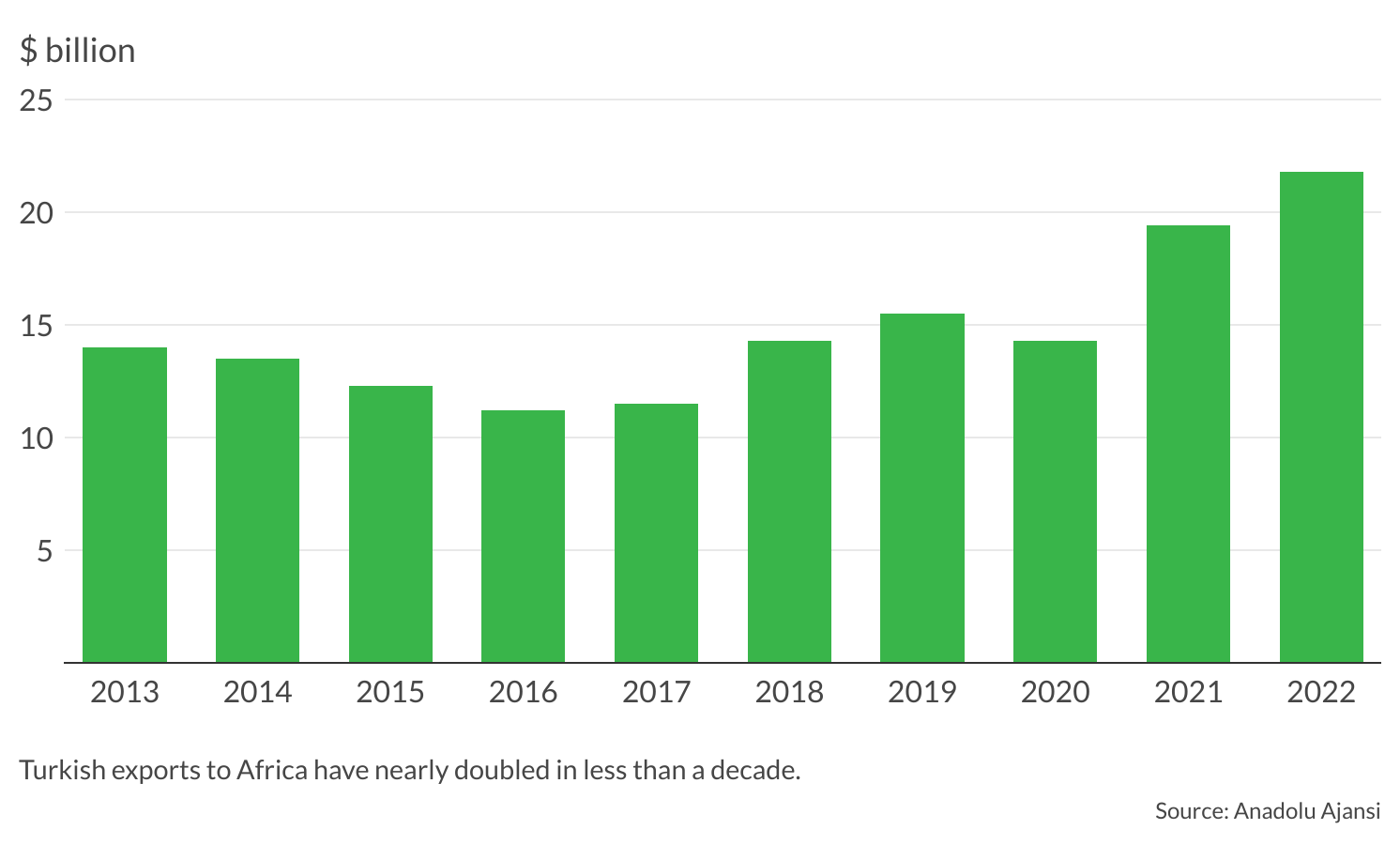The Turkish government’s multifaceted approach to African cooperation is bearing fruit.
 Turkish President Recep Tayyip Erdoğan (right) meets with Somali President Hassan Sheikh Mohamud at the Antalya Diplomatic Forum on March 2, 2024. Under President Erdoğan, Ankara has actively sought to improve diplomatic relations with African countries. ©Getty Images×
Turkish President Recep Tayyip Erdoğan (right) meets with Somali President Hassan Sheikh Mohamud at the Antalya Diplomatic Forum on March 2, 2024. Under President Erdoğan, Ankara has actively sought to improve diplomatic relations with African countries. ©Getty Images×
In a nutshell
The Turkish government has made Africa one of its foreign policy priorities. Trade and cooperation between Turkey and African countries is booming. These strong ties will eventually conflict with Western countries’ Africa strategies. there is a possibility
After inconclusive attempts to improve relations with Europe and later join the European Union in the 1990s and early 2000s, Turkey shifted its focus to Africa. Initially, this change in policy was motivated by the need to secure more diplomatic support in the international arena. However, from around 2005, relations between Türkiye and Africa began to deepen. This growth was not only driven by global geopolitics, but also by the determined approach of the Justice and Development Party and Turkey’s economic boom in the mid-2000s.
Turkey’s involvement in Africa initially relied on soft power such as humanitarian aid, education, and cultural initiatives. Over time, more positive forms of influence have become important aspects of the partnership. For example, in 2011, Turkey played a key role in Somalia, providing aid during a devastating famine. In 2017, it established Camp Turkom, the largest overseas military training facility, in Mogadishu. And in 2019, Turkey intervened in Libya’s civil war, supporting the Tripoli government against General Khalifa Haftar, which was backed by Egypt and Russia.
Türkiye as an alternative to the West and China
Turkey’s relations with Africa have expanded rapidly thanks to Ankara’s ambitious and multifaceted long-term strategy. To expand its influence, Turkey is working with a wide range of actors, including government agencies, private companies, and faith-based organizations. Turkey has stepped up its formal diplomatic efforts, and there are now 44 Turkish embassies in Africa, up from 12 in 2002. The Turkish government has also launched cultural programs, business councils, and opened an extensive aviation network across Africa, with Turkish Airlines currently flying to more than 60 destinations. African destinations.
This strategy is accompanied by a narrative that depicts Turkey as an “Afro-Eurasian” state. President Recep Tayyip Erdogan has shaped a modern vision of Turkey that revives Ottoman traditions while defending Turkish nationalism. He has consistently advocated an overhaul of the world system, positioning his country not only as a supporter of Africa’s aspirations but also as a viable alternative to traditional powers like China and the West.
Like Beijing, the Turkish government values national sovereignty and refrains from imposing political conditions on its partners. In this context, Turkey’s Muslim identity and lack of colonial history are seen as unique strengths. Türkiye’s aid model is also advantageous for African countries. Although funding is limited, grants are negotiated on the basis of bilateral programs, making them an attractive alternative to aid from international organizations with significant political demands.
×
facts and figures
Türkiye’s exports to African countries

Turkey becomes a major security power in Africa
Historically, Turkish influence was mainly limited to North Africa and the Horn of Africa due to geographical and religious ties. However, as previously expected, Ankara is now expanding and strengthening its ties with West African and Sahel countries such as Nigeria and Senegal.
Over the past two decades, trade between Turkey and Africa has increased from $5.4 billion to more than $40 billion in 2022. From consumer to cultural property, pharmaceuticals and construction services, Turkish products and services are making significant inroads into African markets. Its quality and competitive pricing.
Moreover, Turkey plays an important role in Africa’s changing security landscape. Already an important player in North Africa and the Horn of Africa, Ankara has defense agreements with countries in West and East Africa, including Ethiopia, Ghana, Kenya, Nigeria and Rwanda. Agreements vary in content from security provisions and technical assistance to military training, but most include provisions for arms sales.
Learn more about Türkiye
Expanding Türkiye’s defense industry is one of the priorities of President Recep Tayyip Erdoğan’s government. In 2023, Turkey’s defense and aerospace exports increased by 27% to reach an all-time high of $5.5 billion. Growth is expected to accelerate in 2024 after Turkish company Baikal Technologies signed the country’s largest-ever defense contract to sell unmanned combat aircraft to Saudi Arabia. Turkey has become an important player in the global drone industry thanks to the development of competitive models such as Bayraktar TB2 and Akinci.
For African countries, Turkish defense products have many advantages. They are affordable, tested in Libya, Syria, and recently in Ukraine, and are technically reliable. Again, unlike Western countries, Turkey does not make this assistance conditional on its commitment to governance or human rights.
Turkey’s drone and counterterrorism expertise is especially valuable for countries such as Togo, Niger, Nigeria, and Somalia that lack military resources, porous borders, and face rebel movements. . Another sign of Ankara’s growing importance in Africa’s security landscape is new maritime initiatives in the Mediterranean, Red Sea, and Gulf of Aden, including partnerships with Somalia, Sudan, and Eritrea.
×
scenario
The fragmentation of the world order has made it increasingly difficult for the EU to develop a coherent Africa policy, and US efforts on the continent have largely failed. This situation will bring Türkiye and Africa closer together.
Very likely: Türkiye and Africa will continue to cooperate
Given the range of interests involved, including geopolitical concerns, economic interests, and trade trends, relations with Africa will remain a priority even if Turkey has a new leader (which is not expected in the short term) It is expected that this will become a matter of concern. For African countries, relations with the Turkish government will continue to provide opportunities to increase influence, enjoy economic and trade benefits, and secure defense agreements.
Therefore, the most likely scenario is that security cooperation will facilitate the expansion of Turkish-African relations as more African countries rely on Turkey’s defense equipment and expertise. The Turkish government is expected to play an important, and in some cases decisive, role in Africa’s security situation.
Turkey has recently moved closer to Egypt, mainly because of their shared positions on the conflict in Sudan and Gaza. The Turkish government is also manipulating its relations with regional rivals Morocco and Algeria. In the Sahel and the Horn of Africa, Turkey is perceived as less problematic than Moscow or the Wagner Group and more popular than its former suzerains. All this suggests that Turkey remains a strategic partner in Africa.
This development could have two different outcomes in the competition between middle powers in Africa.
Unlikely: the West and Turkey will coordinate their approaches to Africa
The first, but less likely, is convergence between the approaches of Turkey, the EU, and the United States. This could be developed through multilateral engagements such as the NATO framework. All sides could benefit if these major powers adopted a more coherent strategy regarding Africa.
However, despite the possibility of convergence, how Turkey engages with Africa, including its stance on various conflicts across the continent, will ultimately depend on its efforts to manage the complexities of an increasingly fragmented international order. It will depend on Ankara’s global interests as an intermediary country.
More likely: Turkey and the West will compete for influence in Africa
But recent events suggest that diverging paths with the West are more likely. In Niger, the EU and the US have suspended aid to the junta, while Turkey, which has interests in establishing military bases in the country, maintains its support for the new government. Erdogan has said the Economic Community of West African States’ intentions to intervene in the country are unacceptable. Ankara has also positioned itself as a mediator in the Sudanese conflict. Erdogan hosted Sudanese army leader Abdel Fattah al-Burhan in Ankara last September for official talks on bilateral relations.
Contact us for industry-specific scenarios and bespoke geopolitical intelligence. We provide detailed information about our advisory services.

Sign up for our newsletter
Get insights from our experts in your inbox every week.


